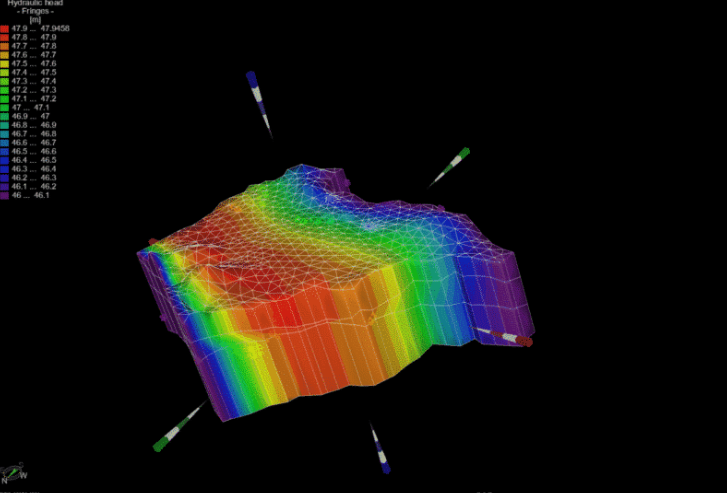Introduction to Hydraulic Modeling Using One-Dimensional HEC-RAS
50 hours / 6 weeks |
|
Online course |
|
|
Dates: 1st of July to 12th of August |
| Standard | Unemployed Or Student |
| $313 | $216 |
Introduction
HEC-RAS (Hydrologic Engineering Centers River Analysis System) is a powerful computer program widely used for hydraulic modeling and analysis of river systems. It was developed by the US Army Corps of Engineers to assist in the design and analysis of flood control and river engineering projects. HEC-RAS is capable of simulating a wide range of river conditions, including steady and unsteady flow, backwater effects, and sediment transport. The software incorporates sophisticated algorithms that can predict water levels, velocities, and flow rates along river channels, as well as the impact of structures such as bridges, culverts, and weirs. HEC-RAS is widely used by water resource engineers, planners, and researchers worldwide to support effective river management and decision-making. This course is designed to familiarize participants with HEC-RAS modeling techniques. By attending this training course, participants can gain valuable knowledge and skills that can help them advance their careers in the water resources engineering field.
Course objectives
This training course is designed to teach participants how to use the software for hydraulic modeling and analysis of river systems. The course covers a wide range of topics, including the basics of river hydraulics, floodplain mapping, and steady and unsteady flow modeling. Participants are also taught how to use HEC-RAS to simulate different river conditions and analyze the impact of structures such as bridges and dams on the river system.
Limited places.
Module 1-Introduction to River Hydraulics:
- – Governing equations.
- – Modeling assumptions, limitations, and constraints.
Module 2-Data Requirements for Successful Modeling:
- – Collection and pre-processing of required data including geometric information and meteorological conditions.
Module 3-Geometric Model Construction:
- – Creation of main components of HEC-RAS geometric model such as streams, cross sections, flow paths.
- – Using RAS-Mapper for pre-processing.
- – Do’s and Do-Not’s.
Module 4-Steady Flow Analysis:
- – Creating and debugging a 1-D steady flow model.
- – Post-processing of results using RAS-Mapper.
Module 5-Unsteady Flow Analysis:
- – Creating and debugging a 1-D unsteady flow model.
- – Using flow time series.
- – Introduction to the use of HEC-DSS (Data Storage System).
Module 6-Hydraulic Structures:
- – Adding various types of hydraulic structures to the geometric model.
- – Analyzing pre- and post-project conditions.
Dr. Maged Aboelata
Dr. Maged Aboelata is a Civil Engineering Manager at Washington Metropolitan Area Transit Authority (WMATA) and an Adjunct Professor at two engineering schools in Washington, DC. With more than 30 years of experience, he participated and directed numerous hydrologic and hydraulic modeling studies for floodplain delineation, flood control, land development, and dam break analysis. His teaching experiences in Water Resources Engineering include Fluid Mechanics, Hydrology and Hydraulics, Advanced Water Resources Engineering, and GIS for Water Resources.
Dr. Aboelata is the author of the initial prototype of HEC-LifeSim, a spatially and temporally distributed model for estimating loss of life resulting from dam breaks and large flood events. The model was later developed and published by the US Army Corps of Engineers; and used a basis for the simplified version HEC-FIA.
The course is delivered online through our easy-to-use Virtual Campus platform. For this course, a variety of content is provided including:
– eLearning materials
– Videos
– Interactive multimedia content
– Live webinar classes
– Texts and technical articles
– Case studies
– Assignments and evaluation exercises
Students can download the materials and work through the course at their own pace.
We regularly update this course to ensure the latest news and state-of-the-art developments are covered, and your knowledge of the subject is current.
Live webinars form part of our course delivery. These allow students and tutors to go through the course materials, exchange ideas and knowledge, and solve problems together in a virtual classroom setting. Students can also make use of the platform’s forum, a meeting point to interact with tutors and other students.
The tutoring system is managed by email. Students can email the tutor with any questions about the course and the tutor will be happy to help.
This course is designed for Civil and Environmental Engineers involved with land development and floodplain analysis studies. Although HEC-RAS software works best with GIS data, broad experience with GIS applications is not required. Basic knowledge of GIS mapping including map projections and datums is assumed. General knowledge of fluid mechanics/hydraulics will be helpful in understanding the different modeling techniques.
Once a student finishes the course and successfully completes the assignments and evaluation tests, they are sent an accreditation certificate. The certificate is issued by Ingeoexpert to verify that the student has passed the course. It is a digital certificate that is unique and tamper-proof – it is protected by Blockchain technology. This means it is possible for anyone to check that it is an authentic, original document.
You will be able to download the certificate in an electronic format from the Virtual Campus platform. The certificate can be forwarded by email, shared on social networks, and embedded on websites. To see an example, click here.
- – Water Resources Engineers.
- – Land Development Specialists.
- – Floodplain and Emergency Managers.
- – Researchers of Water Resources Engineering and Surface Water Hydraulics.
Introduction
HEC-RAS (Hydrologic Engineering Centers River Analysis System) is a powerful computer program widely used for hydraulic modeling and analysis of river systems. It was developed by the US Army Corps of Engineers to assist in the design and analysis of flood control and river engineering projects. HEC-RAS is capable of simulating a wide range of river conditions, including steady and unsteady flow, backwater effects, and sediment transport. The software incorporates sophisticated algorithms that can predict water levels, velocities, and flow rates along river channels, as well as the impact of structures such as bridges, culverts, and weirs. HEC-RAS is widely used by water resource engineers, planners, and researchers worldwide to support effective river management and decision-making. This course is designed to familiarize participants with HEC-RAS modeling techniques. By attending this training course, participants can gain valuable knowledge and skills that can help them advance their careers in the water resources engineering field.
Course objectives
This training course is designed to teach participants how to use the software for hydraulic modeling and analysis of river systems. The course covers a wide range of topics, including the basics of river hydraulics, floodplain mapping, and steady and unsteady flow modeling. Participants are also taught how to use HEC-RAS to simulate different river conditions and analyze the impact of structures such as bridges and dams on the river system.
Limited places.
Module 1-Introduction to River Hydraulics:
- – Governing equations.
- – Modeling assumptions, limitations, and constraints.
Module 2-Data Requirements for Successful Modeling:
- – Collection and pre-processing of required data including geometric information and meteorological conditions.
Module 3-Geometric Model Construction:
- – Creation of main components of HEC-RAS geometric model such as streams, cross sections, flow paths.
- – Using RAS-Mapper for pre-processing.
- – Do’s and Do-Not’s.
Module 4-Steady Flow Analysis:
- – Creating and debugging a 1-D steady flow model.
- – Post-processing of results using RAS-Mapper.
Module 5-Unsteady Flow Analysis:
- – Creating and debugging a 1-D unsteady flow model.
- – Using flow time series.
- – Introduction to the use of HEC-DSS (Data Storage System).
Module 6-Hydraulic Structures:
- – Adding various types of hydraulic structures to the geometric model.
- – Analyzing pre- and post-project conditions.
Dr. Maged Aboelata
Dr. Maged Aboelata is a Civil Engineering Manager at Washington Metropolitan Area Transit Authority (WMATA) and an Adjunct Professor at two engineering schools in Washington, DC. With more than 30 years of experience, he participated and directed numerous hydrologic and hydraulic modeling studies for floodplain delineation, flood control, land development, and dam break analysis. His teaching experiences in Water Resources Engineering include Fluid Mechanics, Hydrology and Hydraulics, Advanced Water Resources Engineering, and GIS for Water Resources.
Dr. Aboelata is the author of the initial prototype of HEC-LifeSim, a spatially and temporally distributed model for estimating loss of life resulting from dam breaks and large flood events. The model was later developed and published by the US Army Corps of Engineers; and used a basis for the simplified version HEC-FIA.
The course is delivered online through our easy-to-use Virtual Campus platform. For this course, a variety of content is provided including:
– eLearning materials
– Videos
– Interactive multimedia content
– Live webinar classes
– Texts and technical articles
– Case studies
– Assignments and evaluation exercises
Students can download the materials and work through the course at their own pace.
We regularly update this course to ensure the latest news and state-of-the-art developments are covered, and your knowledge of the subject is current.
Live webinars form part of our course delivery. These allow students and tutors to go through the course materials, exchange ideas and knowledge, and solve problems together in a virtual classroom setting. Students can also make use of the platform’s forum, a meeting point to interact with tutors and other students.
The tutoring system is managed by email. Students can email the tutor with any questions about the course and the tutor will be happy to help.
This course is designed for Civil and Environmental Engineers involved with land development and floodplain analysis studies. Although HEC-RAS software works best with GIS data, broad experience with GIS applications is not required. Basic knowledge of GIS mapping including map projections and datums is assumed. General knowledge of fluid mechanics/hydraulics will be helpful in understanding the different modeling techniques.
Once a student finishes the course and successfully completes the assignments and evaluation tests, they are sent an accreditation certificate. The certificate is issued by Ingeoexpert to verify that the student has passed the course. It is a digital certificate that is unique and tamper-proof – it is protected by Blockchain technology. This means it is possible for anyone to check that it is an authentic, original document.
You will be able to download the certificate in an electronic format from the Virtual Campus platform. The certificate can be forwarded by email, shared on social networks, and embedded on websites. To see an example, click here.
- – Water Resources Engineers.
- – Land Development Specialists.
- – Floodplain and Emergency Managers.
- – Researchers of Water Resources Engineering and Surface Water Hydraulics.
More info
Finish this course and get a certificate based on Blockchain
Introduction to Hydraulic Modeling Using One-Dimensional HEC-RAS

Blockchain technology makes the certificate incorruptible, enabling companies to verifiy its autenticity.
Introduction to Hydraulic Modeling Using One-Dimensional HEC-RAS
| $313 | $216 | |
| Get more information |




Reviews
There are no reviews yet.